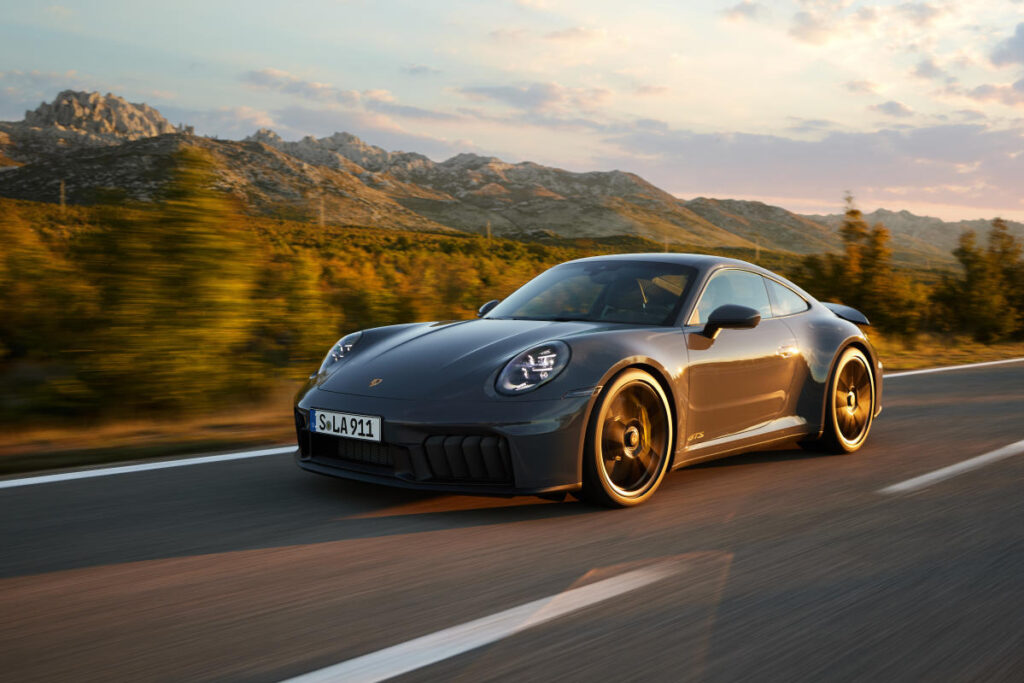The Porsche (P.911.DE) 911 is being electrified for the first time in its 50-year history, with the iconic sports car set to get hybrid power later this year.
Currently slated to be available only on the top-of-the-line 2025 911 Carrera GTS, the “T-Hybrid” system is quite unique in the automotive world: Porsche's setup includes two motors, one attached to the eight-speed PDK (dual-clutch) transmission and one attached to the car's turbocharger.
“We developed and tested different ideas and approaches to determine the best hybrid system for the 911,” said Frank Moser, Porsche vice president and head of the 911 and 718 sports car lines. “The result is a unique powertrain that is well integrated into the overall concept and delivers a significant performance boost.”
According to Porsche, the PDK system's electric motor provides 54 horsepower (40 kW) and 110 pound-feet of torque, giving the 911 a total output of 532 horsepower and 449 pound-feet of torque.
The electric motor in the turbocharger has two roles: it spins the turbocharger faster to increase power output, and it acts as a generator, using the exhaust gases to produce 11 kW of energy.
All of that goes to a 1.9kWh high-displacement battery mounted at the front of the car, which Porsche says was provided by the company's motorsport division. Porsche's prototype race cars, which compete in both the IMSA sports car series in the U.S. and the FIA World Endurance Championship in Europe, use a similar 1.35kWh battery for their hybrid systems.
Paired with a new rear-mounted 3.6-liter flat-six engine, the 911 GTS's T-Hybrid system accelerates the car from 0 to 60 mph in just 2.9 seconds.
Moser said in his presentation that the new 911 GTS' hybrid system is more responsive thanks to the added power, giving it a more “naturally aspirated” feel (which presumably means there's little turbo lag and it's easier to rev), and enabling the car to lap the demanding Nürburgring circuit in 8.7 seconds faster than the outgoing GTS. That's a big improvement.
The change in powerplant for the Porsche 911, famous for its high-revving, air-cooled engine when it debuted nearly 50 years ago, has been met with widespread attention among sports car enthusiasts, but not without controversy.
When Porsche gave the 911 a water-cooled engine in 1999, purists considered it sacrilege, but once they got behind the wheel and saw the power, many changed their minds. Similar concerns emerged when Porsche introduced turbocharging to the base 911 Carrera in 2015, but again the complaints largely faded once the 911's power gains became apparent.
The reaction to the 911 and its new hybrid powertrain remains to be seen, but the sales success of Porsche's iconic sports car is important to the company's bottom line. Last year, Porsche sold 50,146 911s worldwide, up 24 percent from the previous year and the biggest sales increase of any model line.
Porsche is also focusing on electrification. In addition to the all-electric Taycan, the company will soon begin selling an all-electric Macan, which could be a make-or-break model for the German automaker, given that it's the company's flagship model. Porsche sells plug-in hybrid versions of its Cayenne SUV and Panamera sedan.
Porsche says the new 2025 911 GTS with T-Hybrid power will start at $164,900 and is available to order now, while the base-model 911 Carrera with increased power figures (no hybrid available at the moment) will start at $120,100.
Pras Subramanian is a reporter for Yahoo Finance. Follow him at twitter and Instagram.
For the latest stock market news and in-depth analysis, including stock-moving events, click here.
Read the latest financial and business news from Yahoo Finance


